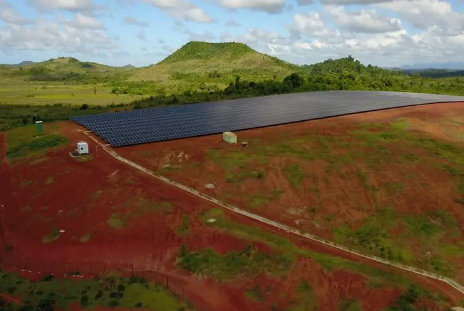The Kolda project, valued at over €105 million, involves two solar PV plants with a combined 60 MW capacity and a 72 MWh BESS, making it the largest initiative of its kind in West Africa.
The project is scheduled to be completed in 2026 and will provide clean energy to 235,000 residents in the Casamance region, improving grid stability and peak-hour supply reliability.
The €84 million debt financing was led by South Africa-based Emerging Africa & Asia Infrastructure Fund (EAAIF), Dutch development bank FMO, and German development finance institution DEG. EAAIF and FMO, acting as Co-Mandated Lead Arrangers, contributed €30.5 million each while DEG provided €23 million.

Site photo of NEA Sambava solar power plant, one of the three solar power plants operated by Axian Energy unit NEA in the SAVA region of Madagascar. Photo courtesy: X account of Axian Group.
Tidiane Doucoure, Director of Emerging Market Alternative Credit at Ninety One Group, the Fund Manager of EAAIF, emphasised that investments in battery technology are pivotal for Africa’s low-carbon transition.
“This transaction marks an important step in ensuring renewable energy projects can integrate seamlessly into existing grids, paving the way for a sustainable energy future,” Doucoure said.
Axian Energy CEO Benjamin Memmi said the project will bring clean solar energy to 25,000 households in the Casamance region.
“Our gratitude goes to EAAIF, FMO, DEG, and Senegalese authorities for their unwavering support of renewable energy initiatives,” he said,
FMO Management Board member Huib-Jan De Ruijter said, “This project is a milestone in Senegal’s renewable energy journey, further integrating solar PV and battery storage into the nation’s energy mix.”
DEG Management Board member Monika Beck added, “This project exemplifies the shift from fossil fuels to sustainable energy solutions, directly aiding electrification in rural Senegal.”
The BESS will provide up to three hours of backup power during peak evening hours, bolstering grid stability and supporting Senegal’s target of 40 percent renewable energy capacity by 2030.